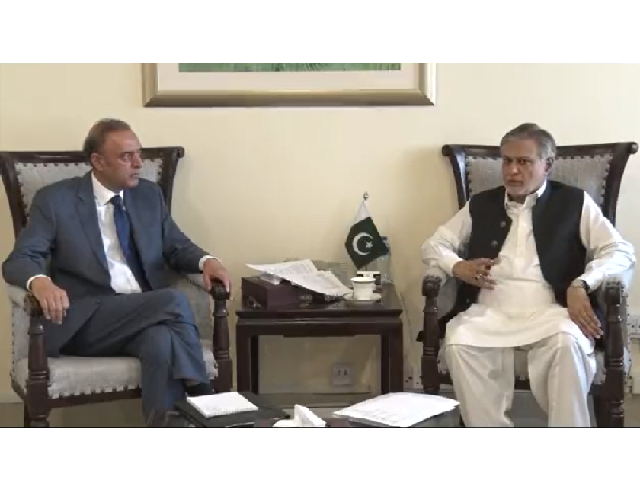Dar seeks to revive Q Block-SBP liaison
Finance minister, governor discuss steps to stabilise economy

Finance Minister Ishaq Dar on Saturday termed linkage between fiscal and monetary policies “imperative” for economic growth – a coordination bridge that the International Monetary Fund (IMF) demolished early this year to get an absolute autonomy for the central bank.
Dar “stressed that the fiscal and monetary policy coordination is imperative for sustainable and effective economic growth”, stated the Ministry of Finance in a handout issued after the second meeting between State Bank of Pakistan Governor Jameel Ahmad and the minster in three days.
The ministry added that Jameel Ahmad “called on” Ishaq Dar at the Finance Division.
As part of a broader plan to give the central bank complete autonomy, the IMF had pushed drastic amendments to the SBP Act of 1956 in January this year as a pre-condition to reviving the bailout programme.
One of the core amendments was the abolishment of the Monetary and Fiscal Policies Coordination Board (MFPCB). The board used to be chaired by the finance minister to align the country’s economic, fiscal and trade policies.
The PPP and the PML-N, which now make the core of the Pakistan Democratic Movement, had opposed ending the board, vowing to restore it once they came to power. However, the IMF had argued that the board’s abolishment was critical to giving functional autonomy to the central bank.
Ironically, the representative of the 96% government shareholding in the SBP –the Federal Finance Secretary- also does not have voting power in the board of the SBP.
Governor SBP Mr Jameel Ahmad called on Federal Minister for Finance Senator Mohammad Ishaq Dar at Finance Division Islamabad and discussed the monetary measures being undertaken for stabilization and growth of the Economy.@MIshaqDar50 @StateBank_Pak pic.twitter.com/DTTH13vJvv
— Ministry of Finance (@FinMinistryPak) October 1, 2022
The meeting between the SBP governor and the finance minister was held three days after the latter said that he would bring changes to unreasonable amendments to the SBP Act at an appropriate time, without explaining them.
In place of the board, the IMF pushed insertion of a loose liaison between the finance minister and the SBP governor, which cannot be deemed as an institutional arrangement between the head of Pakistan’s economy and the chief central banker.
The official handout noted that the meeting between the both also “discussed the measures being undertaken for the stabilisation and growth of the country’s economy”.
Under the revised SBP law, economic growth is now a tertiary objective of the central bank. The SBP amended law has narrowed down the central bank’s focus on price stability and ensuring the financial sector’s viability. But the central bank cannot be penalized for missing the inflation target –another weakness of the revised law.
The finance ministry said that Ishaq Dar shared about fiscal measures being undertaken for economic revival of the country.
SBP Governor Jameel Ahmad “stated that with the arrival of the finance minister, the market sentiments have considerably improved as reflected in the appreciation of the rupee”, according to the press statement.
Since Dar’s arrival, the rupee recovered Rs11.20 to a dollar of its lost value.
The remarks underscore that one of the reasons behind soaring dollar price was weak management of the rupee that allowed the speculators to play with the value of the rupee, causing undue hardships to the people in the shape of imported inflation.
Jameel “was of the view that continuing efforts by the government and the bank will further put a squeeze on those who were manipulating the foreign exchange market”, according to the finance ministry.
A day earlier, Dar vowed to take on the currency speculators, including banks, which have made undue profits on account of foreign exchange earnings. The central bank has served show cause notices to eight commercial banks but has not yet taken final action against them.
The SBP governor apprised the finance minister on different macroeconomic policy initiatives in line with the objectives of fiscal policy taken to achieve sustainable growth, according to the Finance Ministry. He said that SBP was fully committed to support the process of economic revival as per the policies of the present government and assured the Finance Minister of his full support.
However, under the revised law and additional conditions imposed by the IMF through the loan programme the central bank does not provide sufficient leverage to support economic growth, except the interest rate whose movement is also closely monitored by the IMF.
The Finance Minister commended the initiatives of the SBP on introducing digital banking in line with international best practices and Pakistan’s first Instant Payment System- Raast. He also appreciated the role of the SBP for the monetary stability and economic growth of the country.
In a bid to revive the $6 billion loan programme, the Ministry of Finance had conceded significant ground to the central bank in January this year but in return it could not ensure that autonomy was linked with accountability, missing the key objective of legal amendments.



1724319076-0/Untitled-design-(5)1724319076-0-208x130.webp)















COMMENTS
Comments are moderated and generally will be posted if they are on-topic and not abusive.
For more information, please see our Comments FAQ